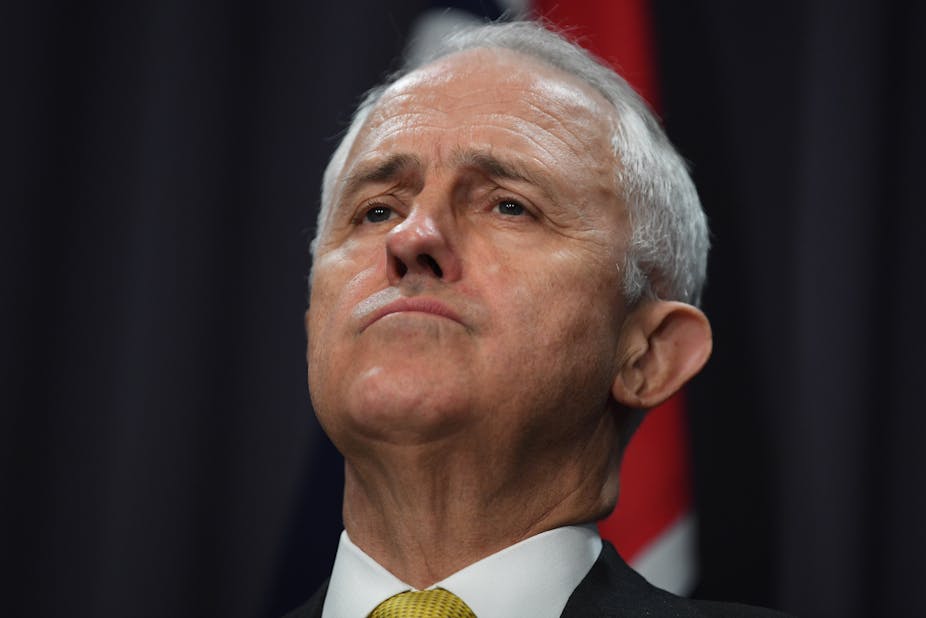When it comes to the Liberals and same-sex marriage, each “solution” seems to lead to a new problem.
Tony Abbott’s plebiscite became bad news for Malcolm Turnbull; now Turnbull’s postal vote – to ask people “Should the law be changed to allow same-sex couples to marry?” – is mired in controversy even before it is formally launched.
The cost will be hefty – up to A$122 million. To be able to conduct the ballot without Senate approval the government is reaching back to a partial precedent from the Whitlam days, when a telephone poll of about 60,000 tested opinion on a national anthem.
The postal ballot will be run under the auspices of the Australian Bureau of Statistics, which will have Australian Electoral Commission officers seconded to it. The money will come from the Finance Minister’s Advance.
Fairfax’s Peter Martin writes: “At a cost of $122 million, the postal plebiscite would become the second-biggest project [the ABS has] ever undertaken, after the $350 million census.” In light of the shambles of the last census, there would be a good deal of breath-holding.
The postal ballot has all the hallmarks of being tied together with bureaucratic and legal hayband, but the government insists it will withstand legal challenge.
Whether it will withstand the political challenges is another matter.
An Essential poll taken before the announcement and published on Tuesday shows a postal vote has reasonable though not majority public support. When people were asked whether they approved or disapproved of holding “a voluntary postal plebiscite followed by a vote in parliament”, 43% were in favour and 38% against.
Turnbull has bought himself immediate relief from the backbench revolt. At Tuesday’s Coalition parties meeting, all five rebels indicated they were backing off action in parliament.
But senator Dean Smith, one of the five, continues to make the case against a postal vote in the media. “I do think the history books will look back on this as not the brightest moment in this government’s history. Not the brightest moment in our democratic practice,” he told Sky.
“Plebiscites are a bad idea. But I have to accept that my colleagues – my great bulk of colleagues – don’t agree with me on that.”
The government is setting a timetable that’s both fast and slow. Legislation for a plebiscite, as distinct from a postal ballot, on November 25, will be voted on (and, we presume, defeated) in the Senate, probably this week. Then the postal vote would run from September 12, when the letters start getting posted, to November 7, with the outcome announced on November 15.
In the event of a “yes” vote, there would be two parliamentary weeks left to get a bill through before Christmas.
The slow part of this timetable is the nearly two months for the postal vote. It hard to judge which side, if either, that long period would favour.
In its conduct, this campaign would be out of the ordinary.
No public money would be allocated for campaigning. Turnbull has made it clear that while he’d be urging a yes vote he has lots of other things to do and wouldn’t be giving too much time to this issue.
Many other politicians would likely take a low-key attitude, though outspoken Liberal senator Eric Abetz was quick to say: “I look forward to engaging with Australians and advocating why marriage should remain as it is”.
The postal vote provides an opportunity for the burgeoning Australian Conservatives. Their leader, senator Cory Bernardi, says: “The Australian Conservatives are the only party that has a policy to maintain marriage in its current form. We’ll be campaigning very hard to win a no vote.”
The pro- and anti-change activists outside parliament would be doing most of the heavy lifting.
Important – indeed, possibly crucial – to the result would be what stand the marriage equality lobby adopted.
Advocates are presently reserving their position. Alex Greenwich, co-chair of Australian Marriage Equality, said on Tuesday the group was “not ruling anything in or out”.
Views are likely to vary in the lobby – from those who feel it’s best to seize even a bad opportunity to hardliners inclined to boycott.
The attitude of the lobby will be central to Labor, once again. The opposition of the gay community was a decisive consideration in Labor’s voting against the plebiscite legislation when it was in parliament initially.
The ALP has a tricky line to walk – it is attacking the process but would it really want to lay itself open to some blame for a negative outcome?
Turnbull defends the postal ballot, which he privately would believe is the least desirable way of dealing with this issue, as fulfilling his election pledge to give the people the say.
Asked at his news conference, “Isn’t a postal plebiscite just a way to have the parliament follow? Why aren’t you leading?”, Turnbull replied: “Strong leaders carry out their promises. Weak leaders break them. I’m a strong leader.”
It was an unconvincing “Me Tarzan” moment.
Update The Senate on Wednesday morning rejected the government’s attempt to bring its bill for a November 25 plebiscite on for debate, thus killing the plebiscite. The vote was 31-31 - a tied vote is a loss.

